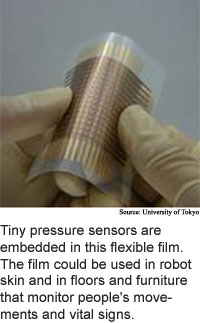Now, scientists at the University of Tokyo have created a flexibile film filled with pressure-sensitive arrays that would provide a robot or some other device with a sense of touch. Such "robot skin" would help robotic arms manipulate with greater precision, and could be used in other applications such as "smart" flooring and furniture.

The uses of such skin are endless. As part of a pervasive computing environment in hospitals, for instance, the skin could be incorporated in flooring (to detect if a patient has fallen) or bedding (to monitor vital signs). Skin could also be added to gym equipment to provide a rich array of feedback, and to car seats to determine whether a driver is fit to take to the road.
The University of Tokyo researchers hope to have a commercially viable version of their robotic skin ready within four to five years.
No comments:
Post a Comment